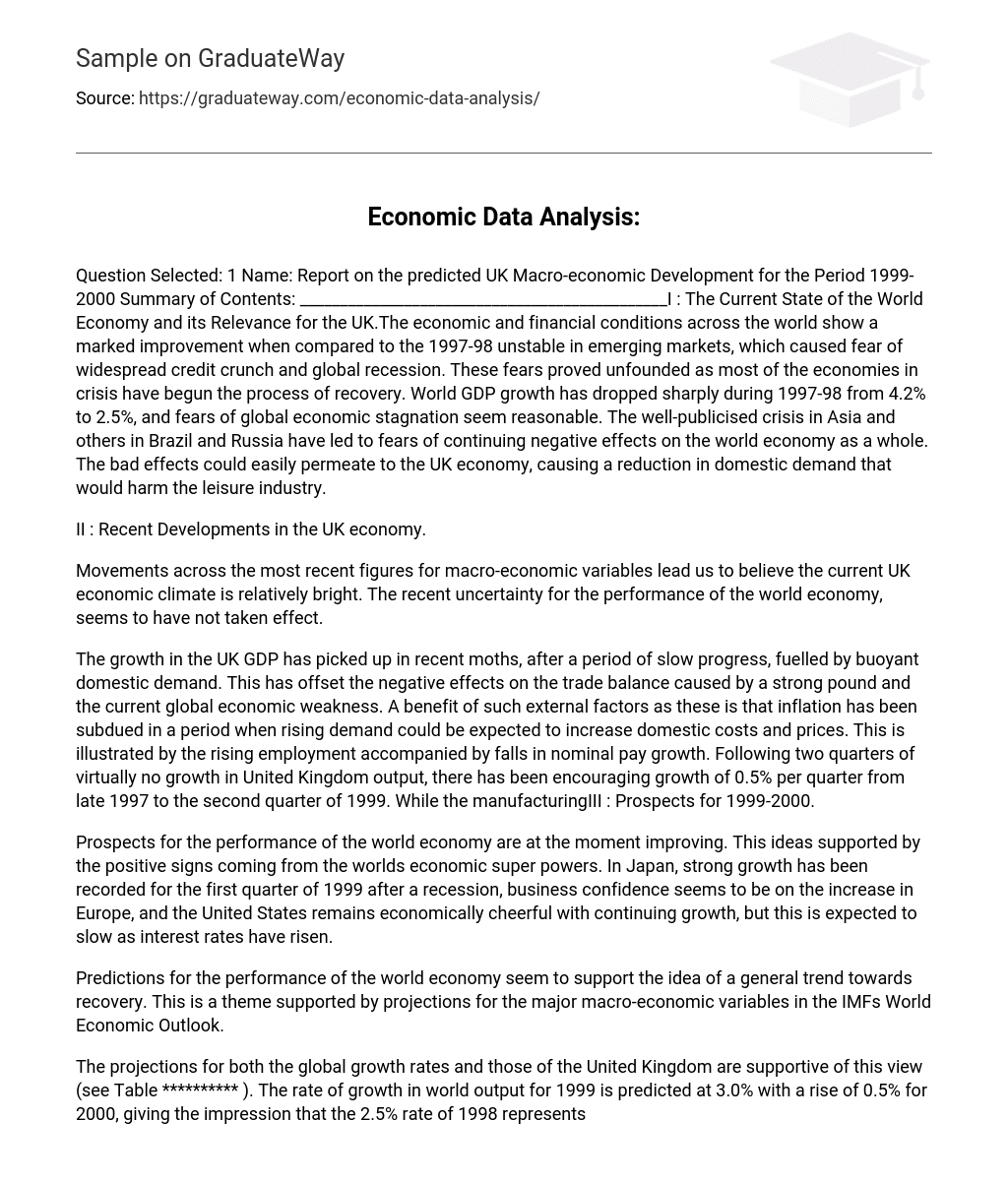Question Selected: 1 Name: Report on the predicted UK Macro-economic Development for the Period 1999-2000 Summary of Contents: ______________________________________________I : The Current State of the World Economy and its Relevance for the UK.The economic and financial conditions across the world show a marked improvement when compared to the 1997-98 unstable in emerging markets, which caused fear of widespread credit crunch and global recession. These fears proved unfounded as most of the economies in crisis have begun the process of recovery. World GDP growth has dropped sharply during 1997-98 from 4.2% to 2.5%, and fears of global economic stagnation seem reasonable. The well-publicised crisis in Asia and others in Brazil and Russia have led to fears of continuing negative effects on the world economy as a whole. The bad effects could easily permeate to the UK economy, causing a reduction in domestic demand that would harm the leisure industry.
II : Recent Developments in the UK economy.
Movements across the most recent figures for macro-economic variables lead us to believe the current UK economic climate is relatively bright. The recent uncertainty for the performance of the world economy, seems to have not taken effect.
The growth in the UK GDP has picked up in recent moths, after a period of slow progress, fuelled by buoyant domestic demand. This has offset the negative effects on the trade balance caused by a strong pound and the current global economic weakness. A benefit of such external factors as these is that inflation has been subdued in a period when rising demand could be expected to increase domestic costs and prices. This is illustrated by the rising employment accompanied by falls in nominal pay growth. Following two quarters of virtually no growth in United Kingdom output, there has been encouraging growth of 0.5% per quarter from late 1997 to the second quarter of 1999. While the manufacturingIII : Prospects for 1999-2000.
Prospects for the performance of the world economy are at the moment improving. This ideas supported by the positive signs coming from the worlds economic super powers. In Japan, strong growth has been recorded for the first quarter of 1999 after a recession, business confidence seems to be on the increase in Europe, and the United States remains economically cheerful with continuing growth, but this is expected to slow as interest rates have risen.
Predictions for the performance of the world economy seem to support the idea of a general trend towards recovery. This is a theme supported by projections for the major macro-economic variables in the IMFs World Economic Outlook.
The projections for both the global growth rates and those of the United Kingdom are supportive of this view (see Table ********** ). The rate of growth in world output for 1999 is predicted at 3.0% with a rise of 0.5% for 2000, giving the impression that the 2.5% rate of 1998 represents the trough in the downward movement of growth in the wake of the recent international crises. The UK is predicted to continue to suffer a lower rate of growth compared to both the world rate and that of other advanced economies, and projections for 1999 suggest the gap will worsen before beginning to improve in 2000. This indicates a trend towards decreasing demand domestically for leisure travel relative to that of overseas markets for 1999, and the gap seems to be worsening if the 1999-2000 projections are accurate.
Projections for the global rate of inflation and real commodity price levels are positive. They show a fall in inflation and continuing moves toward stability in Real Commodity Prices (see Charts ******). The World Real Long-Term Interest Rate also shows signs of stabilising at around 3.5%. These factors all support the idea of a global recovery the positive effects of which could boost the UK economy and the leisure travel industry.
With all these projections, though, there comes the general consensus of uncertainty among figures for the next couple of years. The link between the United States growth rate and the world rate means that uncertainty in the US economy (see Table *****), resulting from factors such as the inflated stock market valuation and low household saving, could alter the global recovery trend.
IV : BIBLIOGRAPHY





